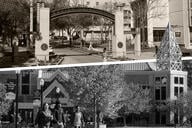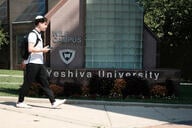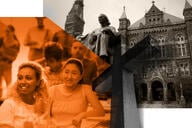You have /5 articles left.
Sign up for a free account or log in.
Benedictine University’s new “Theology of Love” class will cover areas of moral theology, yes (issues of sexual and social ethics), but also sacramental theology (marriage, for instance), and systematic theology (including Christology, or the study of Jesus). It’s one of four courses comprising a new “Theology in Life” certificate program – and a component of a new bachelor’s degree in theology, which is being billed as relevant to variety of career paths. And daily life.
“Most people are not going to go into church ministry. They need a theological education that relates the rest of their life to the theological assumptions,” said Chris Fletcher, an assistant professor who’s starting up the theology program for the Illinois-based, Roman Catholic university.
“If we don’t have lay Catholics in the world who understand their faith and how to apply it – to journalism, to movie-making, to their law practice, to their business – we’ve failed, basically. Because that’s the lay vocation, saving the world in our daily work.” Benedictine is among several Catholic universities reporting increased undergraduate interest in theology departments, which are serving students with a range of interests.
Benedictine’s new “Theology in Life” certificate program includes one class each in the theology of freedom, justice, love, and science, respectively. Majors will go on to take upper-level courses in areas including sacramental theology, the New Testament, and Catholic spirituality. The capstone for the major program, Fletcher explained, will be a seminar relating theology to an area of life. “Someone who’s doing science education and theology for example would do a project on, say, the theology of stewardship and environmental science,” she said. A student double-majoring in math and theology, she continued, could study the problem of knowledge.
“You start with the questions people have about life, and then, ‘What are the answers? Why would you take a Catholic position?'” said Fletcher.
This generation of undergraduates is, both by empirical and anecdotal accounts, acutely interested in the so-called “big questions." A survey of 112,000 freshmen conducted by University of California at Los Angeles researchers in 2004 found, for instance, that 74 percent of first-year students discuss the meaning of life with friends, and 76 percent search for life’s purpose. Some involved with undergraduate theology instruction at Catholic colleges said they saw Benedictine’s new program in the context of students' spiritual hunger -- and their desire to candidly address life's fundamental questions in the classroom.
“When students elect to study theology, only a few of them anticipate going on into pastoral ministry of some sort. [Most] are not interested in theology because they want to become a priest or a nun or a pastor or maybe even an educator at a high school or a college. They are interested in theology because of the subject itself, and they see that it might have application in a lot of different aspects of life,” said Brian Robinette, an assistant professor and undergraduate program director for theological studies at Saint Louis University. In calls to undergraduate theology program directors at peer institutions a year and a half ago, Robinette found that directors reported “a significant uptick in the number of undergraduate students who have expressed an interest in studying theology, across the board. In our own department, I’d say about 10 years ago, we had a pretty small group of undergraduate students as majors” – hovering between five and 12. Now, he said, St. Louis has about 75 undergraduate majors, and another 105 minors.
What’s new, Robinette said, is that, while many students at religious institutions have traditionally found theology through core course requirements, more are now coming to college already interested.
“One can speculate about why that’s occurring, and I don’t know that I have a really good answer to that. Other than that I think that students are finding that with the diversity in theology today, with its ability to cover things like ethics and just war issues, but also to engage other religious traditions and tap into the depth of experience that human beings have or yearn for and so forth, that there’s just sort of an opening."
“There is a sort of fearlessness that students can feel once they’ve spent a little bit of time in a theology course. They want to ask the big questions, and sometimes in ways that may seem to previous generations as a bit irreverent. But they’re not irreverent at all,” Robinette said, adding that this has required faculty to engage in new ways. “What this requires of teachers, people who are in this profession, is to risk themselves in the classroom, to be open to these kinds of questions, to put their professional objectivity or detachment to the side, to roll up their sleeves.”
“Probably what’s always been there is a sense that you need to connect what you study in an academic way with how it fits into your experience. Meaning questions, ‘so what’ questions, are important. Those have probably become more explicit over the past 10 years,” said the Rev. Dale Launderville, chair of the theology department at the College of Saint Benedict and Saint John’s University, in Minnesota (which has seen, he estimated, about a 50 percent increase in the number of theology majors in the past four years.)
He guessed that the shift to more explicitly address the big questions in theology classes has happened in response to rising student demand. "I think we adapt to that. But I don't know if we've done anything specifically to cause it."




